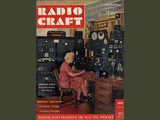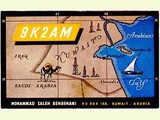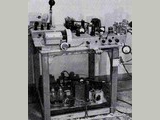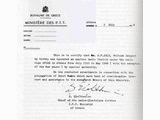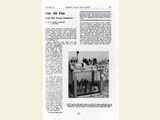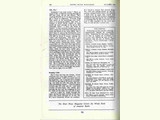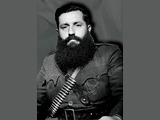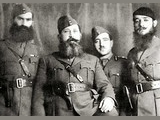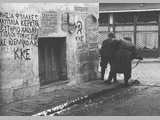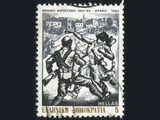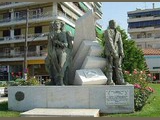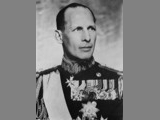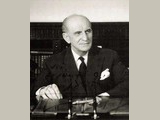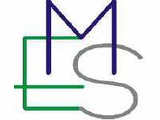Amateur Radio in Greece
by Norman F. Joly, G3FNJ, SV1RX
The dawn of Amateur Radio in the U.K. and Greece by Norman F. Joly was published, in 1990, by Ability Printing, Harrow, U.K. (ISBN 0 9515628 0 0). We publish the chapters relating to the history of Amateur radio in Greece, with the author's kind permission from his personal copy which contains some corrections and amendmends to the printed version. The full text of the book can be downloaded from the file below.
The First Greek Radio Amateurs
v.l.: Takis Coumbias, ex. SV1AAA; George Zarifis, SV1AA; Norman F. Joly, SV1RX; Pol Psomiadis, SV1AZ
_thumb.jpg)
![]() As no licences were issued for many years there are no official records to be consulted. Early activity was mainly in and around Athens but there may have been one or two stations in other parts of the country which we never heard in the capital. At the time of writing (1987) four of the original pioneers in the Athens area are alive and three of them are currently active on the H.F. bands.
As no licences were issued for many years there are no official records to be consulted. Early activity was mainly in and around Athens but there may have been one or two stations in other parts of the country which we never heard in the capital. At the time of writing (1987) four of the original pioneers in the Athens area are alive and three of them are currently active on the H.F. bands.
Athanassis 'Takis' Coumbias has QSL cards addressed to him dated 1929 when he was a short wave listener in Odessa, Russia with the SWL callsign RK-1136. In 1931 his family, like many other Greek families in Russia, moved to Athens where Takis built a 4-valve transmitter with which he was very active on 40 and 20 metre CW using the callsign SV1AAA.
I frequently operated his station myself and when I asked him why he had chosen that particular callsign he gave me what proved to be a truly prophetic answer. "It will be ages," he said, "before the Greek State officially recognizes the very existence of radio amateurs and begins to issue transmitting licences to them. After that it might take another 50 years for them to get to the three - letter series beginning with SV1AAA."
In actual fact this is what happened: legislation was enacted 40 years later and the callsign SV1AAA was officially allocated to Nikita Venizelos after 54 years had elapsed!
World War II And After In Greece
![]() Socrates Coutroubis SV1AE described to me how his interest in radio was aroused in 1935 when he was 13 years old. His father had decided to buy a domestic radio receiver. "Of course in 1935 Athens had no broadcasting service," Socrates said, "so the receiver had to be able to tune in to the short wave broadcasting bands. As we already had a Westinghouse refrigerator my father decided we should try one of their receivers. When I say 'try' I must explain that it was the usual thing to ask a number of agents to submit their latest models for comparison at one's home. I remember that together with the Westinghouse, we had an Atwater Kent, Philco, RCA, Stromberg- Carlson and several sets of European manufacture such as Philips, Blaupunkt, Saba etc. We finally settled for the German Saba because it was the prettiest and blended better with our living room furniture!
Socrates Coutroubis SV1AE described to me how his interest in radio was aroused in 1935 when he was 13 years old. His father had decided to buy a domestic radio receiver. "Of course in 1935 Athens had no broadcasting service," Socrates said, "so the receiver had to be able to tune in to the short wave broadcasting bands. As we already had a Westinghouse refrigerator my father decided we should try one of their receivers. When I say 'try' I must explain that it was the usual thing to ask a number of agents to submit their latest models for comparison at one's home. I remember that together with the Westinghouse, we had an Atwater Kent, Philco, RCA, Stromberg- Carlson and several sets of European manufacture such as Philips, Blaupunkt, Saba etc. We finally settled for the German Saba because it was the prettiest and blended better with our living room furniture!
The Affair Of The Piraeus Police
_thumb.jpg)
![]() In 1947, there was a war in northern Greece which some people called a civil war and others a war against the guerrillas, depending on whose side they were on. Suddenly one morning all the Athens newspapers came out with some amazing headlines:
In 1947, there was a war in northern Greece which some people called a civil war and others a war against the guerrillas, depending on whose side they were on. Suddenly one morning all the Athens newspapers came out with some amazing headlines:
"THE WIRELESS TRANSMITTERS OF THE COMMUNISTS HAVE BEEN SEIZED IN ATHENS"
"WIRELESS TRANSMITTERS FOUND IN COMMUNIST HANDS"
"HOW THE FIVE TRANSMITTERS OF THE COMMUNISTS WERE DISCOVERED"
"THE SIX INSTALLATIONS SEIZED BY THE POLICE"
Two of the newspapers printed the identical photograph (included in the montage) with the following caption, 'The Communist transmitters seized by the Piraeus police'. This was a photograph of the shack of Mikes Psalidas SV1AF. At the top right one can see a 2- inch home -made monitor oscilloscope, which the newspapers described as a 'powerful radar'!
"During the last three days," wrote one newspaper, "the police in Piraeus have been investigating a very serious case implicating leading cadres of the Communist party."
Attica Amateur Radio Club
_thumb.jpg)
![]() "During the ten years following the end of World War II there were about 15 to 20 very active amateurs in the Athens area, all using callsigns of their own choice because no government legislation had yet been enacted. Most of these operators subsequently obtained licences and had to change to the official series. I remember two YLs who were very popular in Europe and the U.S.A. because they spoke several languages fluently, but they never re- appeared when licences began to be issued."
"During the ten years following the end of World War II there were about 15 to 20 very active amateurs in the Athens area, all using callsigns of their own choice because no government legislation had yet been enacted. Most of these operators subsequently obtained licences and had to change to the official series. I remember two YLs who were very popular in Europe and the U.S.A. because they spoke several languages fluently, but they never re- appeared when licences began to be issued."
Since 1945 the U.S. and British signals units were authorised by the Greek Ministry of Communication s to issue calls to military and diplomatic personnel in the series SV0WA in the case of American staff and SV0AA for the British.
Socrates continued: "I heard that the Americans had formed a club called 'Attica Amateur Radio Club' in Kifissia, a suburb to the north of Athens, and in due course I was able to become a member."
The Aegaian conflict

![]() In the Peace Treaty of Lausanne of 1923, Turkey confirmed large cessions of former Ottoman territory to Greece and Italy which had been de facto under their control since 1911 or 1913. The chain of the Dodecanese islands were ceded to Italy. Later the rights to these islands were ceded by Italy to Greece with the 1947 Treaty of Paris. However, the Treaty of Lausanne does not mention every single small island by name, but treats them summarily. Accordingly, at the heart of the legal issue is the question whether some islands, by virtue of their geographic situation, fall under the scope of the renunciation of sovereignty and the cession to Italy as defined by certain articles of the Treaty of Lausanne. The United Nations maintaines a headquarter at Rhodes, in 1950, to negotiate the conflict.
In the Peace Treaty of Lausanne of 1923, Turkey confirmed large cessions of former Ottoman territory to Greece and Italy which had been de facto under their control since 1911 or 1913. The chain of the Dodecanese islands were ceded to Italy. Later the rights to these islands were ceded by Italy to Greece with the 1947 Treaty of Paris. However, the Treaty of Lausanne does not mention every single small island by name, but treats them summarily. Accordingly, at the heart of the legal issue is the question whether some islands, by virtue of their geographic situation, fall under the scope of the renunciation of sovereignty and the cession to Italy as defined by certain articles of the Treaty of Lausanne. The United Nations maintaines a headquarter at Rhodes, in 1950, to negotiate the conflict.
Call Signs American Amateur Stations in Greece - QSL Gallery
Note: Addition of Documentary Archive Radio Communications
Since 1945 the U.S. and British signals units were authorised by the Greek Ministry of Communications to issue calls to military and diplomatic personnel in the series SV0WA in the case of American staff and SV0AA for the British.
Call Signs British Amateur Stations in Greece - QSL Gallery
Since 1945 the U.S. and British signals units were authorised by the Greek Ministry of Communications to issue calls to military and diplomatic personnel in the series SV0WA in the case of American staff and SV0AA for the British.
Personal Reminiscences And Anecdotes
f.l. Aghis Cazaris, SV1CA; Bill Tavaniotis, SV1KE. Stehend: Dimis Stampadas, SWL, Pol Psomiadis, SV1AZ

![]() Two are of particular interest: the account given to me by Takis Coumbias formerly SV1AAA of the early days of amateur radio in Russia and the story of the Greek broadcasts from Cairo, Egypt during the German/Italian occupation of Greece in World War II.
Two are of particular interest: the account given to me by Takis Coumbias formerly SV1AAA of the early days of amateur radio in Russia and the story of the Greek broadcasts from Cairo, Egypt during the German/Italian occupation of Greece in World War II.
(1) Athannasios „Takis“ Coumbias (1909-1987)
When I met Takis in his office in May 1983 I told him I was thinking of writing a small book about the history of amateur radio in Greece before it was too late— so many of the old timers had already passed away. Little did we both suspect at the time that he also would not live to see the finished project. I asked him how far back he could remember. "Well, I can start from 1924 when I was about 15 and living in Odessa in the Soviet Union. There was a lot of interest in wireless and two magazines were published in Russia which dealt mainly with the construction of receivers. My interest was first aroused when a friend of mine at school proudly showed me something he had just made. It was, he told me, a variable capacitor and he was going to use it to make a radio receiver. The contraption was enormous by today's standards and must have weighed about half a kilo. My friend said it had a capacity of 250 micro- micro farads, which meant absolutely nothing to me at the time.
"When he completed his receiver I became very interested and decided I would build one too.
(2) Pol Psomiadis N2DOE (ex SV1AZ)
The text which follows was written by Pol N2DOE of Bergenfield NJ.
Norman Joly and I first met in 1935 when I started working with Bill SV1KE as his radio mechanic. Norman was then working for the local agents of RCA selling broadcast receivers. The last time I saw him before the war, was in September 1939. I was still working with Bi
ll and I went to the British School of Archaeology in Athens to deliver a National NC 100 with a Spiderweb all- band antenna. Norman had been recruited to set up a monitoring station for the Press Department of the British Embassy, which had been moved to a building in the grounds of the school. After the end of the war I saw him again in 1948 in the uniform of a Superintendent of Police working in the British Police Mission to Greece. He told me he had obtained a special licence and was back on the air with his pre- war callsign SV1RX.
In 1951 I emigrated to Brazil where I stayed for 17 years and then came to the U.S.A. in 1968, where I have been ever since. We had lost contact with each other and it was five years later that I found Norman's address in the American callbook. I wrote to him and in his reply he begged me to come on the air again. Owing to a prolonged family illness which culminated in the loss of my beloved wife it was 1980 before I was in the mood to take up amateur radio once again, with my present callsign N2DOE.
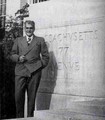
![]() (3) Comstantine "Bill" Tavaniotis, SV1KE
(3) Comstantine "Bill" Tavaniotis, SV1KE
There is no doubt that the most active and best known amateur in Greece before World War II was 'Bill' SV1KE. He was active on 20 and 10 metres on AM phone and CW, using his famous McElroy 'bug' to good advantage. (No electronic keyers and no 15 metre band in those years). Tavaniotis was born in Rostov, USSR, of Greek parents. His father was a well- known doctor. Like many other Greek families Bill and his parents left Russia in the early years of the Communist regime and moved to Istanbul, Turkey, where he began his studies at the famous Robert College. Later he went to London where he first came into contact with radio amateurs, while studying Electrical Engineering. After that he went to Belgium.
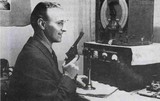
![]() Harry Barnett, SV1WE (G2AIQ)
Harry Barnett, SV1WE (G2AIQ)
In July 1946, Harry Barnett, a Royal Air Force officer attached to the Press Department of the British Embassy in Athens obtained an experimental transmitting licence from the W/T section of the Ministry of Posts & Telegraphs, with the callsign SV1WE. At that time he was living in a flat in Athens and could not put up an antenna, so it was not until June 1947 that he became active.
The terms of his licence were in themselves rather strange, one might even say quite 'experimental', the final paragraph reading:
"This experimental research must be carried out asfollows:-
1. With a maximum power of 50 watts.
2. In the frequency bands (harmonics) 130, 260, 520 Mc/s.
3. In the frequency bands 28 Mc/s and 56 Mc/s.
4. With the call sign SV1WE."
From June 1947 until April 1948 Harry worked 61 countries, mostly on phone in the 10 & 20 metre bands, at a time when there were not many stations on the air— a minute fraction of the millions now active. He used a National HRO receiver he had got off a scrap heap which he modified to take the efficient EF50 valves in the R.F. stages and EF39s in the I.F. The transmitter was completely 'home brew', consisting of a metal 6L6 Franklin oscillator on 3.5 MHz followed by two more 6L6s doubling to 14 MHz. In the final amplifier stage Harry used a Telefunken pentode, the famous and very efficient RL12P35 which was used in the German tank transmitters in all stages, oscillator, P.A. and audio amplifier/suppressor grid modulator. He adopted the same method of modulation using a record player amplifier and an Astatic crystal microphone.
W.A.C. was achieved by February 1948 with about 50 watts of R.F. into a simple dipole antenna. During the ten months that SV1WE was active 750 QSL cards were sent out. Of the 61 countries worked only 49 were confirmed. Today (1989) Harry is still regularly on the air under his original callsign G2AIQ which was first issued to him on the 1st of January 1938, 51 years ago.
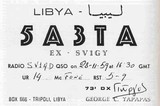
![]() (5) George Yapapas, SV1GY)
(5) George Yapapas, SV1GY)
George Yiapapas is a Greek amateur who was very active for over 25 years yet nobody seems to have heard of him. In 1935 George and his father Costas built a one- valve transmitter using a type 59 pentode with suppressor grid modulation, and succeeded in contacting most of the world with this QRP rig. The electron coupled oscillator could not have put more than 4 or 5 watts into the antenna.
After the war George went to Jordan in 1956 to work for Cable & Wireless the English company which operated the old Eastern Telegraph cable network. He used the callsign JY1GY for about a year and was then transferred to Tripoli in the Kingdom of Lybia, during the reign of King Idris, where he obtained an official licence with the call 5A3TA. In 1960 he was again transferred, this time to Kuwait, where he operated the equipment of Mohamet Behbehani 9K2AM for over six years. George now has a small shop in Piraeus, the port of Athens and is no longer active on the amateur bands.

![]() (6) Stefanos Eleftheriou
(6) Stefanos Eleftheriou
Stefanos Eleftheriou, Head of the Telecommmunications section of the Ministry of Posts & Telegraphs (Greek initials T.T.T.) played a vital role in the early development of amateur radio in Greece. When he returned from Switzerland, where he had studied Electrical Engineering, he had to do his compulsory military service which had been deferred while he was completing his education. A friend of his told him "Don't go into the Army, join the Navy; they have an amazing wireless station at Votanikos with which they can contact the Fleet anywhere in the world". As it happened there was a vacancy for an officer and Stefanos together with another young man called Nikolis faced a Selection Board of naval officers who really didn't know what qualifications they were looking for. He was successful whereas Nikolis went to the Ministry of Posts & Telegraphs where he ended up as Director- General many years later.

![]() (7) Norman F. Joly, SV1RX (G3FNJ)
(7) Norman F. Joly, SV1RX (G3FNJ)
I was born in Izmir (then known as Smyrna), on the west coast of Turkey in Asia Minor, in 1911, of British parents. My British nationality was established through the Treaty of Capitulation which was then in force between Turkey and the United Kingdom of Great Britain and Northern Ireland. I remember there was a British Post Office in Smyrna and we posted our letters with British postage stamps (of King Edward VII) overprinted with the word LEVANT.
My grandmother on my father's side had come from Russia. It is a strange coincidence that Takis Coumbias (ex SV1AAA), Bill Tavaniotis (ex SV1KE) and I all had roots in southern Russia. My grandmother on my mother's side was the daughter of the Dutch consul in Smyrna. Quite a mixed bag. In 1922, at the end of the war between Turkey and Greece, the town of Smyrna was destroyed by fire when the Greek army was routed. My widowed mother with four young children, was advised to take us on board a British merchant vessel while the town changed hands.
Excursion: The resistance years
(Note: A comprehensive paper about this time span can be found here: ![]() ext. Link )
ext. Link )
In the latter part of April 1941 the German army marched into the northern suburbs of Athens at 11 o'clock in the morning. At 3 o'clock in the afternoon of the same day, a strong unit of the Gestapo arrived in the southern suburb of Kallithea and surrounded the block in which my house was situated and broke into it, looking for me and my transmitter. Of course I had dismantled everything 19 months previously and even taken down the antenna. So after this long period of QRT how did they know where to find me? Well, FOUR YEARS EARLIER I had won the first prize for Greece in the D.A.S.D. DX Contest for 1937 and the German society had sent me a nice certificate. You can draw your own conclusions. I heard later (because I had left a few days earlier for Egypt with the staff of the British Embassy) that the Gestapo had visited all the active amateurs and had managed to arrest only one of them, Nasos Coucoulis SV1SM (later SV1AC) and put him in a concentration camp in Italy for nearly a year. I would like to sketch briefly the turbulent events of the following three years with some extracts from my diaries.
(7) Norman F. Joly, SV1RX (G3FNJ)- continued
When I returned to Athens in October 1944 on H.H.M.S. AVEROF I had been appointed Radio Monitoring Officer of the Anglo-Greek Information Service (A.G.I.S.) with a staff of about 25 W/T operators and typists to assist me. My unit was a section of the Press Department of the British Embassy. I think the choice of title was a rather unfortunate mistake. The English words 'information' and 'intelligence' have only one equivalent word in Greek pliroforiesq. And most Greeks hold peculiar views about the C.I.A. and the British Intelligence Service. So here I was strutting about in the uniform of a war correspondent bearing the flashes 'I.S.', the butt of many a joke from my friends who accused me of being a master spy. My boss, Colonel Johnson, who had been the British Council representative in Greece prior to the outbreak of war in 1939, came to my office one morning and told me that he had heard a
rumour that King George of the Hellenes, who was then in London, was going to broadcast in the Greek service of the B.B.C. I replied I had heard nothing, but would try and find out if the rumour was true. As he left my office I glanced at my watch; it was 11 o'clock in the morning, 9 o'clock in London. I telephoned the General Manager of Cable & Wireless, Mr Briggs, who was a personal friend. I told him I wanted to make use of his facilities to ask an urgent question of the B.B.C. in London. He replied, "Tell McTaggert" (the engineer in charge of the Central Telegraph Office) "that I said he should help you in any way possible."
"Mac," I said over the telephone, "would you get one of your operators to ring the B.B.C. in Bush House (from where the World Service originates) and ask them if they have any plans for a broadcast by King George of the Hellenes." I immediately tuned one of my receivers to the frequency of the London telegraph link, which was carrying high speed morse traffic. In a short while the tape was stopped and an operator, using a hand key, asked my question slowly in plain language, and then the tape was put on again. I waited anxiously for about five minutes. Again the tape was stopped, a single letter 'R' (for received) was sent by hand, and traffic returned to normal. My telephone rang; it was McTaggert. "Nothing doing, old boy. The B.B.C. have no plans for such a broadcast." I thanked him and looked at my watch. It was 11.25, just 25 minutes had elapsed. I called my boss and told him the answer to his question. "How do you know?" he asked. "I asked the B.B.C., sir." "You what?" he shouted at me. "Don't you know there's a war on? I'm coming to see you." He stormed into my office and demanded an explanation, so I told him what I had done. "Good God, what is this going to cost us?". "Nothing at all, sir. There is no provision for anything like that in the operating procedure". "Then I must write a letter to Cable & Wireless to thank them." I thought to myself, why don't you write a letter to Norman and thank him for having friends in the right places. But I kept my mouth shut.
Wartime Radio from Cairo
This chapter of Norman Joly's book is stored in our Broadcast section at Wartime broadcasts from Cairo
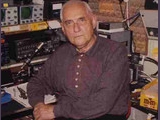
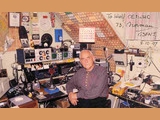
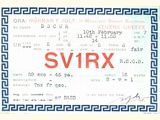
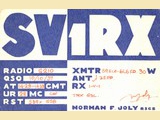
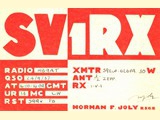
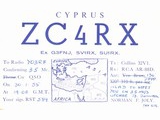
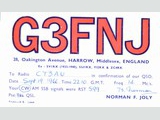
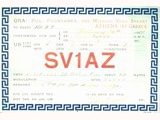
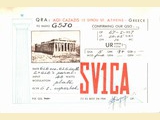
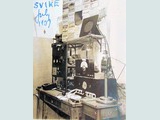
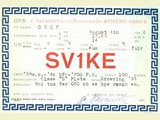
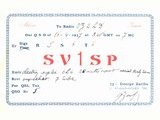
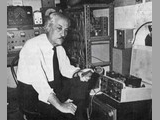
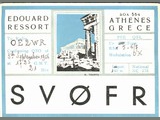
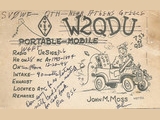
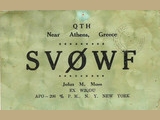
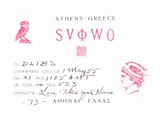
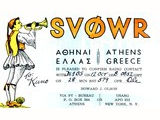
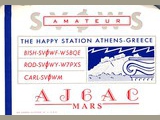
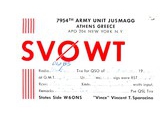
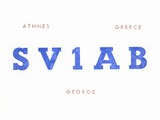
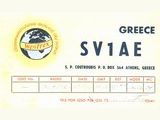
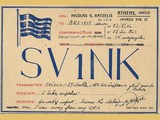
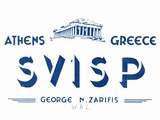
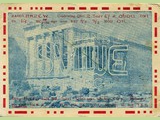
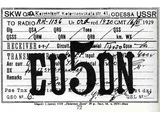
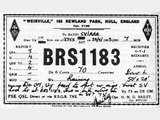
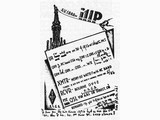
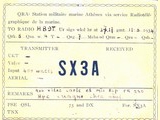
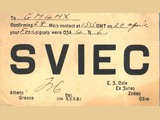
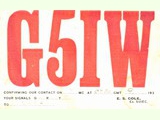
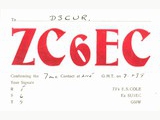
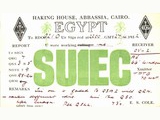
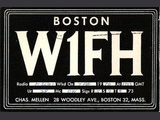
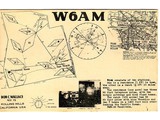
_pthumb.jpg)
